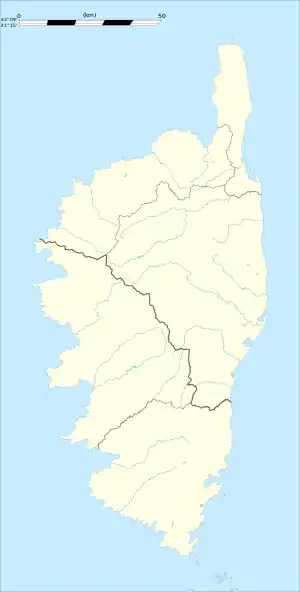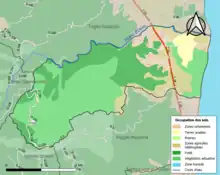Talasani | |
|---|---|
Location of Talasani | |
 Talasani  Talasani | |
| Coordinates: 42°24′32″N 9°28′50″E / 42.4089°N 9.4806°E | |
| Country | France |
| Region | Corsica |
| Department | Haute-Corse |
| Arrondissement | Corte |
| Canton | Casinca-Fumalto |
| Intercommunality | Costa Verde |
| Government | |
| • Mayor (2020–2026) | Francis Marcantei[1] |
| Area 1 | 10.09 km2 (3.90 sq mi) |
| Population | 827 |
| • Density | 82/km2 (210/sq mi) |
| Time zone | UTC+01:00 (CET) |
| • Summer (DST) | UTC+02:00 (CEST) |
| INSEE/Postal code | 2B319 /20230 |
| Elevation | 0–487 m (0–1,598 ft) (avg. 392 m or 1,286 ft) |
| 1 French Land Register data, which excludes lakes, ponds, glaciers > 1 km2 (0.386 sq mi or 247 acres) and river estuaries. | |
Talasani (French pronunciation: [talazani]) is a rural commune and village on the eastern seaboard of Corsica, in the Haute-Corse department of France. The area has a very low population density and mainly comprises forests and farmland. As a coastal municipality, Talasani enforces strict urban planning provisions in order to preserve the ecological balance of the coast.
Geography
Talasani is a village on the eastern coast of Corsica, part of the canton of Casinca-Fumalto. It was once part of the piève, or religious district, of Tavagna. Today, Talasani belongs to the Communauté de Communes de la Costa Verde of Costa Verde, a microregion north of the Plaine orientale.[3]
Town planning
Typology
Due to its low population density, Talasani is designated as a rural commune according to the municipal density grid of Insee.[note 1][4][5][6][7] It belongs to the urban unit of Penta-di-Casinca, an agglomeration comprising 7 communes and 9,501 inhabitants as of 2017.[8][9]
The commune is within the metropolitan area[note 2] of Bastia, which includes 93 communes and belongs to the category of urban areas with between 50,000 and 200,000 inhabitants.[10][11]
The municipality bordered by the Mediterranean Sea is also a coastal municipality within the meaning of the law of 3 January 1986, known as the coastal law.[12] Specific urban planning provisions therefore apply in order to preserve natural spaces, sites, landscapes and the ecological balance of the coast. For example, this limits building outside already urbanized spaces within 100 metres (330 ft) of the coastline, or more if specified by local zoning.[13][14]
Land use

According to the European database of biophysical land use, Corine Land Cover (CLC), Talasani's land use consists mostly of forests and semi-natural environments (75.5% in 2018). This proportion has changed very little since 1990 (75.4%). The detailed breakdown in 2018 is as follows: shrub and/or herbaceous vegetation (46.6%), forests (28.9%), heterogeneous agricultural areas (12.2%), urbanized areas (8.3%), permanent crops (3.9%), artificial green spaces, non-agricultural (0.1%), maritime waters (0.1%).[15]
IGN also provides an online tool to compare the evolution over time of land use in the municipality (or in territories at different scales). Maps or aerial photos are available depicting multiple eras: the Cassini map (eighteenth century), the staff map (1820-1866), and the current period (1950 to today).[16]
Population
|
| ||||||||||||||||||||||||||||||||||||||||||||||||||||||
| Source: EHESS[17] and INSEE (1968-2017)[18] | |||||||||||||||||||||||||||||||||||||||||||||||||||||||
See also
Notes
- ↑ According to the zoning of rural and urban municipalities published in November 2020, in application of the new definition of rurality validated on 14 November 2020 by the interministerial committee of ruralities.
- ↑ In October 2020, the notion of city catchment area replaced the old notion of urban area, to allow consistent comparisons with other European Union countries.
References
- ↑ "Répertoire national des élus: les maires". data.gouv.fr, Plateforme ouverte des données publiques françaises (in French). 2 December 2020.
- ↑ "Populations légales 2021". The National Institute of Statistics and Economic Studies. 28 December 2023.
- ↑ "Site officiel de la Communauté de Communes de la Costa Verde" (in French). Retrieved 27 November 2021.
- ↑ "Typologie urbain / rural | L'Observatoire des Territoires". www.observatoire-des-territoires.gouv.fr. Retrieved 24 December 2021.
- ↑ "Définition - Commune rurale | Insee". www.insee.fr. Retrieved 24 December 2021.
- ↑ "Comprendre la grille de densité | L'Observatoire des Territoires". www.observatoire-des-territoires.gouv.fr. Retrieved 24 December 2021.
- ↑ "Unité urbaine 2020 de Penta-di-Casinca (2B203) − COG | Insee". www.insee.fr. Retrieved 24 December 2021.
- ↑ "Base des unités urbaines 2020 | Insee". www.insee.fr. Retrieved 24 December 2021.
- ↑ "Toujours plus d'habitants dans les unités urbaines - Insee Focus - 210". www.insee.fr. Retrieved 24 December 2021.
- ↑ "Aire d'attraction des villes 2020 de Bastia (104) − COG | Insee". www.insee.fr. Retrieved 24 December 2021.
- ↑ "En France, neuf personnes sur dix vivent dans l'aire d'attraction d'une ville - Insee Focus - 211". www.insee.fr. Retrieved 24 December 2021.
- ↑ "Les communes soumises à la loi littoral | L'Observatoire des Territoires". www.observatoire-des-territoires.gouv.fr. Retrieved 24 December 2021.
- ↑ "La loi littoral | Collectivités locales" [Coastal law | Local authorities] (in French). Archived from the original on 13 April 2021. Retrieved 24 December 2021.
- ↑ "Loi relative à l'aménagement, la protection et la mise en valeur du littoral". Ministère de la Cohésion des territoires et des Relations avec les collectivités territoriales (in French). Retrieved 24 December 2021.
- ↑ "CORINE Land Cover | Données et études statistiques". www.statistiques.developpement-durable.gouv.fr. Retrieved 24 December 2021.
- ↑ "Remonter le temps". remonterletemps.ign.fr. Retrieved 24 December 2021.
- ↑ Des villages de Cassini aux communes d'aujourd'hui: Commune data sheet Talasani, EHESS (in French).
- ↑ Population en historique depuis 1968, INSEE